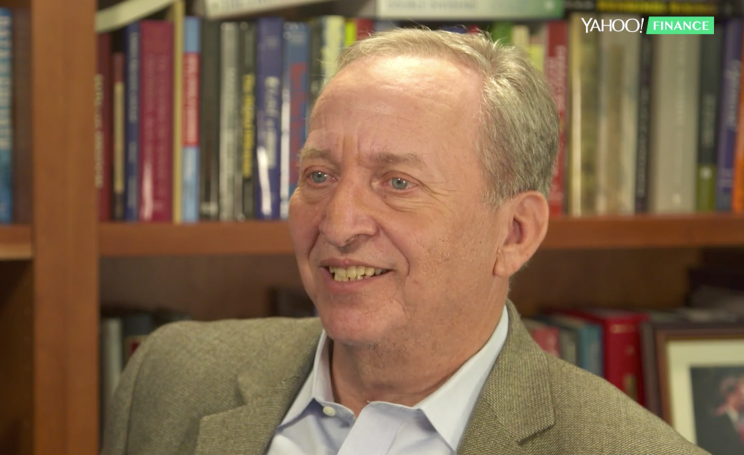Yahoo Finance's full interview with Larry Summers
Larry Summers is a not a believer—at least at this point.
The former Treasury Secretary cast doubt on many of the policies set forth by the Trump Administration during an interview in his offices at Harvard University. Though he noted it was still “early days” and that the new administration had done very little implementation, Summers said “that the sense of uncertainty that’s being introduced is something that’s potentially very dangerous.”
Summers, the Charles W. Eliot University Professor of Harvard University and the former President of that university, spoke on a wide range of economic issues including trade, tax reform, and relations with China. He also challenged current National Economic Council director Gary Cohn, the former president of Goldman Sachs, to present evidence that the Dodd-Frank Act was causing banks to spend hundreds of billions of dollars in unnecessary costs. “I’ve challenged the White House to produce any documentation for it. None has been forthcoming,” says Summers, who was a former director of the NEC during the Obama Administration.
Summers said he supports financial deregulation, but it has to be the right kind of deregulation: “Sure, there’s issues that need to be fixed with respect to community banks. Sure, there’s areas where there’s probably too much bureaucratic complexity,” he said. “But a wholesale revision of the kind that they seem to be talking about? Very, very dangerous.”

On trade too, Summers noted that there are certainly issues, but that Trump administration was taking the wrong tack. “Should the United States stand up for the enforcement of trade agreements when people are violating them,” Summers asked? “Absolutely. Are there respects in which trade agreements could be strengthened? Yes, there are. On the other hand, the kind of truculence we’ve seen projected, I think potentially can do enormous damage.” Summers continued: “I think the things that have been said in the trade area are wildly irresponsible, and potentially very dangerous.”
Summers cited Mexico as a specific example of flawed thinking on trade. “So far, we’ve talked about not liking NAFTA, and we’ve yelled at a few companies. And maybe we’ve gotten 1,000 jobs relocated back to the United States,” says Summers. “But in the process, we’ve driven the peso down by 15%, and that’s made Mexico have a 15% labor cost advantage that it didn’t have before we started pursuing these policies. So, I think on net what’s happened has been an unambiguous and clear negative for the industrial heartland of our country. And I think a failure to recognize macroeconomic linkages through exchange rates is a fatal flaw in a great deal of what the Trump Administration is doing,” he said.
While saying that that he’s “a strong supporter of tax reform,” and pointing out that “the details of tax legislation haven’t been spelled out,” Summers took issue with Congressman Ryan’s tax plan. “I don’t think the vision put forward by Congressman Ryan is a viable vision. I think it would do substantial damage to the global economy, because of the combination of the big appreciation the dollar would likely generate, and the disruption to existing economic arrangements through the penalty for exports that would come. So, I don’t think we’ve yet seen a sound fiscally responsible pro-incentive plan. But I think if one could be developed, there would be significant benefits to the economy.”
As for President Trump’s calling China a currency manipulator, Summers called that “incredible,” saying it was “many days late, and many dollars short.” Said Summers: “I think the currency manipulation argument is something that had validity at one point,” but not any more, as the Chinese are now actually trying to keep people from selling its currency for dollars.
Summers also said he’s concerned that stock market gains are unsustainable, saying “my fear is that it will turn out that the strength in markets will be seen in retrospect as having been something of a sugar high.”
Though Summers was critical of much of what is transpiring in Washington, he noted that it was important for any criticism to be constructive and not emotional.
More from our interview with Larry Summers:
Larry Summers is worried about ‘enormous damage’ to the economy
Larry Summers warns against drawing conclusions from the stock market
Stay tuned to Yahoo Finance for more clips from our interview with Larry Summers.
